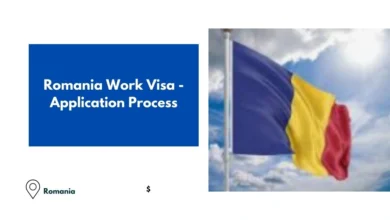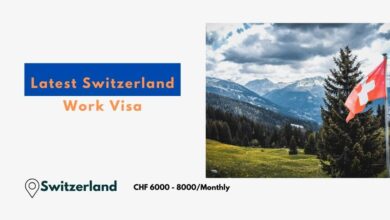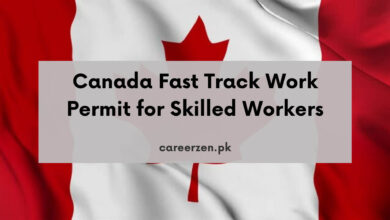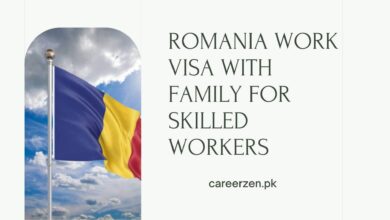How to Get Poland Work Visa – Working in Poland
Does Working in Poland Require a Visa? Yes, we go over how to obtain a work visa for Poland in 2025. One EU country that has grown in popularity as a place for foreigners to visit and work is Poland. Poland issued the most work visas in 2024 and the first quarter of 2025. I’ll explain the Poland work visa process for 2025, the various kinds of work permits available, and the qualifications needed to obtain one. According to Statistics Poland, 504,172 foreign workers were granted work licenses in Poland.
It increased by 24% in 2021. If they have a work permit, foreigners are allowed to work in Poland. However, a long-stay visa allows you to enter Poland. Working in Poland does not require a work permit for EU nationals. Citizens of non-EU nations must have a valid work permit, but some nationalities can enter Poland without a visa.
Details of Poland Work Visa 2025:
| Visa category: | D- Type of National Visa |
| Job country: | Poland |
| Permit Type: | Work |
504,172 work permits in total in 2025
- Ladies: 31.2%
- Men: 68.8%
- Sector of Industry/Job: Manufacturing
- Establishment
- Construction
- Transportation and Storage
- Administrative and Support Service Activities
- Elementary Occupations
- Plant and machine operators and assemblers
- Craft and related trades work
What is a work permit in Poland?
Foreign workers are permitted to work in Poland by a legal document called a work permit.
What is the National D Visa for Poland?
One can stay for more than ninety days, but not more than a year, with a D-type national visa. You’ll update your visa after it expires.
For a maximum of 90 days, travel to the other Schengen Area Member States is also permitted with a D-type national visa.
Kinds of work permit in Poland
- Permit A: This permit is required if you have been offered a position by a Polish employer, firm, or registered enterprise.
Work Permit B: If you are an employee or a board member and plan to stay in Poland for more than six months, you must have a type B permission.
Work permit C: This is also known as an intra-company transfer visa. if your boss sent you to the company’s Polish branch.
Work Permit D: If a foreign company sends you to Poland to perform export-related activities, The foreign employer is not allowed to have a branch in Poland.
Work Permit S (Seasonal): This permit is required if a foreign company sends you to Poland for lodging, hunting, fishing, or agricultural work.
Types of Poland working visa
- Type A: Type A visas are used for airport transit.
- Type C: Travel and visits are the main uses for Schengen visas, sometimes referred to as Type C visas.
- Type D: Mostly given to people who are visiting Poland for work, school, or training, the Type D Visa is a long-term national visa.
Eligibility criteria for Poland working visa
To obtain a D visa for Poland, typically required for long-term stays for work or business, you need to gather specific documentation. Here’s a comprehensive list of documents usually needed:
1. Employment-Related Documents
- An official job offer is a signed, original letter from a Polish employer outlining the job title, pay scale, and terms of employment. This needs to be in line with your particular job function and working environment.
- Work Permit: The Voivodeship Office, a local government office, is where your employer must apply for a work permit on your behalf. Before you may apply for the D visa, the permit needs to be authorized and issued.
2. Identification and Travel Documents
- Valid Passport: Make sure your passport has two blank pages and is valid for at least three months after the planned stay.
- Visa Application Form: Fill out the national visa application (D visa) and sign it.
- Two recent passport images that satisfy the Schengen photo criteria are usually required.
3. Proof of Accommodation
- Accommodation Information: Records attesting to your lodging arrangements while in Poland, such as a lease or an invitation letter from a Polish host.
4. Financial Proof
- Proof of Funds: Documentation, such as bank statements or an employer’s letter of financial support, attesting to your ability to sustain yourself while visiting.
- Proof of Salary: The employment offer should specify whether your employer offers accommodations or other benefits.
5. Police Clearance
- A certificate from the police or other appropriate body attesting to your clean record is called a certificate of police clearance. A professional translator may be required to translate this certificate into Polish or English, and it must be recent—usually within three to six months.
6. Medical Insurance
- Health Insurance: Evidence of health insurance covering your stay in Poland, either in the form of a policy that satisfies the requirements for a Schengen visa or proof that, once employed, you will be covered by Polish public health insurance.
7. Educational and Professional Qualifications
- Relevant Certificates: copies of your professional and academic credentials, which may be necessary for your position.
8. Visa Fee
- Relevant Certificates: Copies of your professional and academic credentials, which may be necessary for your position.
Applying process for Poland working visa
- Receive a job offer from the employer in Poland.
- On your behalf, your employer submits an application for a work permit.
- You go to the Polish embassy and apply for a work visa. (Verify the Polish embassy in your nation, schedule a visit, and get your paperwork ready).
- The application fee for a visa will be paid by you.
- Await the outcome of the visa decision.
- Go to Poland and get to work.
- Obtain an offer of employment from the Polish employer. The links can be found below.
- Your company files for a work permit on your behalf.
- You apply for a work visa at the Polish embassy. (Confirm the presence of the Polish embassy there, make an appointment, and collect documentation).
- You will be responsible for paying the visa application fee.
- Await the outcome of your visa application.
- Go to Poland and get to work.
Conclusion
Poland remains an attractive option for foreign workers due to its growing economy and demand for international talent. In 2025, obtaining a work visa involves careful preparation of documentation, securing a job offer, and understanding the different types of work permits. By following the outlined steps, non-EU nationals can successfully navigate the visa application process and start their employment journey in Poland.
Frequently Asked Questions
Do I need a visa to work in Poland as a foreigner?
Yes, non-EU nationals need a valid work permit and a long-stay national D visa to work in Poland. EU nationals do not require a work permit.
Can I travel to other Schengen countries with a D-type visa?
Yes, a D-type national visa allows you to travel to other Schengen Area member states for up to 90 days.



